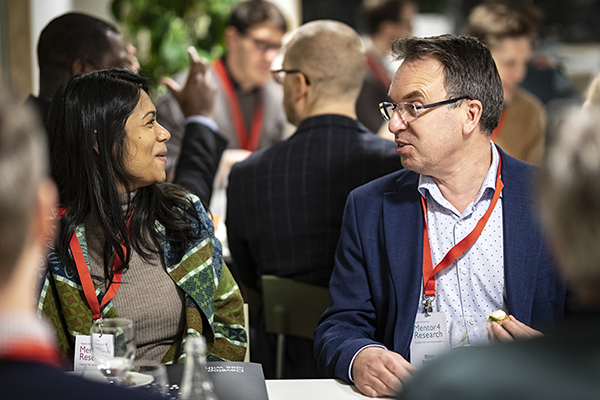“This is a great opportunity for researchers who have started or want to start developing an idea from research towards a broader application. Having a sounding board with relevant experience and someone who can open doors to new contacts outside academia is very valuable,” says Nhils Forslund, Advisor at UU Innovation and Program Head along with colleague Hillevi Englund.
One semester, six meetings
UU Innovation has been running the Mentor4Research program since 2016. Starting in 2022, the program will take on a new form and a new name: UU Innovation Mentor Program. In its new form, the program will run for one semester instead of its previous duration of almost a year. The program has a joint kick-off and closing meeting for all participants. It also includes a workshop on the art of networking and building a useful network. Each mentor and researcher pair will meet on six occasions, which they arrange themselves based on their own schedules. In parallel, the researcher will receive support and advising from UU Innovation on topics such as funding and intellectual property rights.
“The mentor does not replace the support from our advisors, but instead serves as extra support for the researcher and someone who can contribute other knowledge and contacts,” explains Nhils.
The shortening of the program has several advantages.
“It gives greater flexibility to those who are interested in the program but may not be able to participate for almost a full year. In addition, it will now be possible to offer the program twice a year, once per semester. All in all, it will simply give more researchers the opportunity to take part in the program,” states Nhils.
Individual development journey with mentor support
A variety of mentor programs are available at Uppsala University. The UU Innovation Mentor Program aims to give researchers even better opportunities to contribute to the utilisation of research results. The mentors of the program work outside academia, for example in industry or government, and are selected to match each individual participant with respect to the field, idea and need.
“We do not work with a pool of mentors. We instead seek out and hand pick a mentor who can best support the development of that particular researcher’s idea,” explains Nhils.
He also says that the mentors themselves often have a relationship with Uppsala University, as former students or researchers, and that they are keen to give back by sharing their experience, contacts and networks.
The heart of the program is the personal dialogue between the researcher and mentor. Each participant sets their own goals together with their mentor, so there are no expectations that they will have reached a specific phase of development or achieved a certain result by the end of the program. Things will simply be shaped differently for each participant.
“We want the researcher to become more interested and engaged in the application of research results outside academia. So, the main thing is for the researcher to find their way and their role in that process,” states Nhils.
From third-year doctoral students to professors
The program is open to third-year doctoral students and upwards, in all disciplinary domains. Nhils explains that you simply need to be at a certain stage of your research to get the most out of the program.
“The doctoral student or researcher needs to have an idea or question related to the utilisation of their own research. This is where the mentor can be of most help.”
When asked why such a program is needed, Nhils states that many doctoral students and researchers are interested in knowing how their research could be used and create benefit beyond academic publications.
“This is a program for those curious about just that, who want to learn more and are committed to moving forward with an idea and the application of their research results.”
Finding your idea
Despite having a great deal of knowledge in your own research field, it may be difficult to know which of your results have the potential to create value outside your immediate research environment. UU Innovation has developed a simple self-test that can help you get an initial idea of what it is that you actually produce in your research in terms of e.g. data, methods and models, and who could benefit from this.
“If you do not really know if you have an idea or what could be an idea in your research, the self-test is a great first step. If you also want an introduction to the test and inspiration to get started, you are welcome to take part in one of our lunch seminars in the autumn,” says Nhils, adding that they can be found in the calendar on the Staff Portal and on UU Innovation's website.
He also stresses that people should not hesitate to apply for the UU Innovation Mentor Program, even if their idea is new and loosely formulated.
“If you have research results you think could create societal benefit, we will help you put the idea in concrete terms. The willingness and courage to test your idea is key. If it does not work out, that is also a result, and you have learned a lot in the process.”
